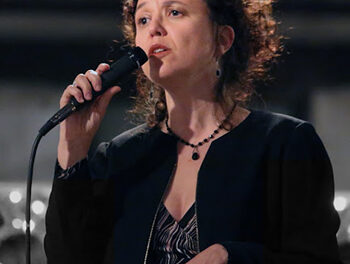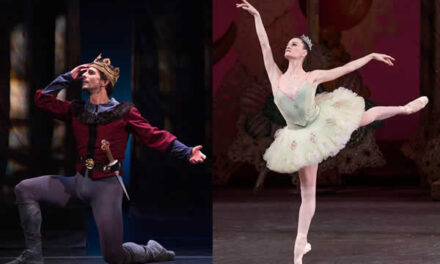For this concert, Verena Mösenbichler-Bryant, conductor of the Duke University Wind Symphony, put together a program of music entitled “Mother Earth.” Some selections had specific and clear expressions of a variety of the earth’s wonder as experienced through the eyes, ears, and minds of contemporary composers. Others were more derivative of the dominant residents of the earth.
The opening piece was John Williams‘ 1984 “Olympic Fanfare and Theme.” With brass and percussion at full tilt, it filled Baldwin Auditorium with glorious heroic music. The ensemble was tight, and the instrumental balance was unrestrained but secure. With some 70+ woodwind, brass and percussion players, one string bass player is now added to the ensemble. Sometimes doubling the tuba or the tympani or other lower instrument, this practice adds richness and depth to the over-all timbre.
Frank Ticheli (b.1958) is a popular composer of symphonic band music and a highly sought clinician for workshops. (He will appear with Duke University Wind Symphony and The North Carolina School of Science & Math Wind Ensemble in Baldwin Auditorium in November.) His “Earth Song” was composed originally for unaccompanied chorus singing his own text. The text was read, or rather quoted, from memory, by bass clarinetist Paul Popa, in a near professional baritone voice. The music unfolded with broad melodic lines, subtly shifting harmonies and expressive dynamics in a paean to the music of the earth. The music echoes the text: “I’ll sing. I’ll be … Live … See.”
It was over sixty years ago, as a high school all-state band participant in Virginia, that I had my introduction to Ralph Vaughan Williams’ magnificent English Folk Song Suite. It proved a pure delight to perform and continues to provide great joy every time it is heard. Mösenbichler-Bryant took it at a spritely tempo and danced, marched, or sang her fine ensemble through this unforgettable masterpiece. A handful of brief solo passages were well-played with a special pat on the back for trumpeter Melissa Klein’s expressive work.
“Mother Earth: A Fanfare,” composed in 2001 by David Maslanka, began the second half of the concert. Inspired by words of St. Francis of Assisi, which were beautifully spoken by Popa, the music involved a variety of interesting percussion sounds and a driving rhythm dominated by the feel of syncopation.
This was followed by John Mackey‘s 2012 composition, “Sheltering Sky.” In striking contrast to the previous piece, it unfolded like heavy cream over fresh fruit. Shifting harmonies define the work; gentle folk-inspired melodies emerge and weave their way through what seemed like one continuous cadence which finally comes to a serene rest at the end. The Wind Symphony demonstrated musical understanding and achievement in the warm rich sounds of their performance.
The next selection returned to driving strong rhythm with Vaughan Williams’ “Toccata Marziale.” The program notes reminded us that quintessential bandsman Frederick Fennell called it “one of the most significant contributions to the wind band literature.” It is a contrapuntal masterpiece weaving vigorous rhythms in brilliant scoring and achieving sonorities of amazing color and excitement. It was performed with virtuosic drive and precision.
So what was next? Another of those harmonically delicious, richly-scored contemporary pieces, demonstrating, coincidentally, Mösenbichler-Bryant’s wide knowledge of the wind symphony repertoire. “City Trees” was composed by Michael Markowski in 2012 in appreciation of the resilience of the trees he found thriving in New York City after moving there from Arizona. It begins with a gentle, tenuous theme which grows through several permutations, achieving tenaciousness and then full competence before ending with quiet confidence. This kind of music enabled the Wind Symphony to communicate effectively with the audience, and they did it well.
The concert concluded with the rip-snorting “Galop” from the satirical operetta Moscow, Cheryomushki by Dimitri Shostakovich. Filled with delightful humor and raucous romps which the ensemble obviously relished, it was an ideal finale to a fine concert. Thanks, Duke Wind Symphony!












